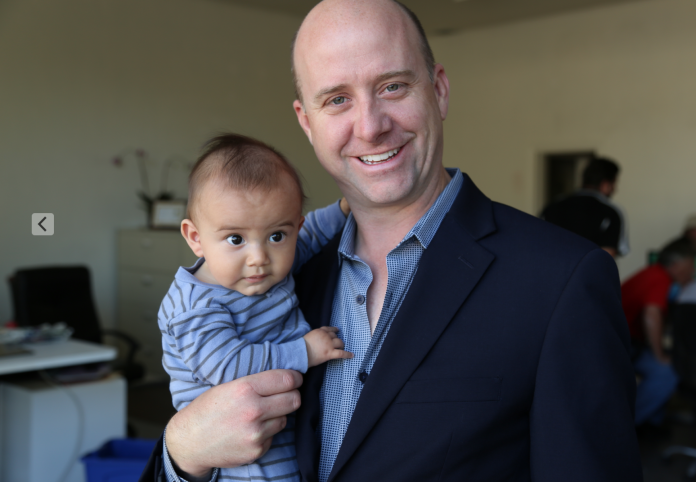
No stranger to the dais, Gilroy City Council candidate Daniel Harney was appointed to the council in January after former Mayor Don Gage resigned a month earlier, fallout from the since rescinded 721-acre housing proposal that threw the legislative body into a moment of chaos and led to the successful urban growth boundary petition campaign that resulted in Measure H.
A global senior manager at Ebay, where he’s worked for the last nine years, and a self-described “Gen-Xer,” Harney beat out seven other applicants to earn his spot on the council. For the last nine months, he has only missed one council session, when his wife was giving birth to their second son, Urban, now five months old and a regular companion to Harney on the campaign trail.
Over the course of his campaign he’s found that land use, the mayoral race and the state of the city’s streets have been at the top of Gilroy voters minds. He’s also encountered people just wanting to vent.
“Whether you look nationally, regionally or locally, there is a real issue about trust. ‘Are you listening to my concerns and are you doing something about my concerns?’ That’s what I hear when I’m walking down the street, or in forums, these are the concerns that keep coming up,” he said.
Regarding land use, Harney is up front about his views.
“The city is going to grow,” he said. “Gilroy is one of the last cities [in the county] that has buildable land. We need to make sure we have the right leadership both at the council level and city staff level to see that through.”
Noting the recent departure of traffic engineer Henry Servin, known for bringing roundabouts to the city and advocating for the city at the VTA, the upcoming retirement of longtime public works director Rick Smelser and Police Chief Denise Turner as well as the departure of finance director Christina Turner, who left Gilroy in March to become the new Assistant City Manager for Administrative Services in Morgan Hill, Harney said it’s important for the city to find the right people to fill these critical roles.
Not a supporter of Measure H, the urban growth boundary initiative that would lock in how and where the city could grow for the next 20 years, and require voter approval for any future amendment of the boundary, Harney said it was the limited land inventory included in the measure and how that could impact Gilroy’s ability to attract new businesses to the city that was most concerning.
“In my experience, industry looks for three things before making a move into a new location: buildable land—is there enough land inventory—30 to 40 acres to build on? Are the urban services available there—water, electric, sewer? And how easy is it to work with the city? Getting building permits, getting the environmental review done, going through the architecture and site review.”
Using the 45-acre UNFI natural foods distribution plant as an example, Harney said Gilroy does not have the current land inventory—the 30 to 40 acres needed—for a new UNFI or a data center or a warehouse or performance center.
“The land just doesn’t exist,” he said. “So if you look at that comprehensively, that’s why I’m against Measure H. We can relax or change policies all we want to entice businesses, but if you don’t have [buildable land] or [urban services], then businesses won’t come.”
Also, there is the cost of holding an election each time an amendment to the boundary is required, he said. The estimated cost of holding a stand-alone special election for a single ballot item in Gilroy is about $336,000, according to a staff report prepared last year. Based on the number of voters in the city, the cost is likely higher due to intervening voter registrations.
In addition to serving on a VTA sub-committee, Harney represents Gilroy on the Silicon Valley Clean Energy Authority Board of Directors and Executive Committee, which will bring cleaner electricity to Gilroy businesses and residents starting next year.
Harney says he also wants to look at various ways to reinvigorate downtown.
“Are there any new ideas or strategies that we can bring to redeveloping downtown—either waiving some of the business impact fees or delaying those business impact fees and letting them pay over a five-year period to really incentivize people to come downtown.”
Read more of Daniel Harney’s views here: https://www.facebook.com/harneyforcouncil/.












